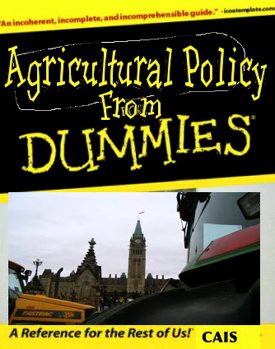
Call it “Agricultural Policy for Dummies.” That’s the book I could write. However, it wouldn’t be fiction. Go back to the day when former Prime Minister Jean Chretien announced the now discredited Agricultural Policy Framework and you’d have it. Years later most of us are still paying for that. As one farmer asked me today, who are the “dummies?” Are they the policy makers who cooked it up or is it the farmers?
Think about it for a moment. I know most of you are focused on Friday’s USDA planted acreage and stocks report. Anything less than 90.6 million acres of corn will be considered bullish. Anything less than the 67.1 million acres of soybeans predicted in March will be bullish. The bottom line is with a Canadian loonie hovering around 94 cents and our American cousins locked into $4 corn revenue insurance, things could get dicey. Looking for hope in our Canadian agricultural policy world is a road to nowhere.
Maybe I shouldn’t be so cynical, but it’s hard. I completed my 2006 CAIS form last Thursday. I completed it online, which is quite a feet considering the whole CAIS policy was forged on a back of a napkin. Not only that but it has been panned by just about everybody. Federal Auditor General doesn’t like, federal agriculture minister Chuck Strahl says he doesn’t like it, most farmers don’t like it, and even the Liberals who defended it blindly now say it was oh so wrong. Needless to say the deadline to submit this piece of garbage is July 3rd. The least the government could do is refund the CAIS fee, which was due many months ago.
The point is many farmers participate in this program because they know any hair brained agricultural policy idea, which becomes politically motivated will go through CAIS. In other words if lightening strikes they want to be in the game. That’s exactly why I filled out the application. Needless to say the CAIS bureaucrats assured me the program is being changed as I write. Dah! Is that anyway to forge an agricultural policy.
The answer of course is no by any stretch of the imagination. However it is what it is. Skeptics might say, well Phil, what would you do? Thankfully I’ve had 20 years writing this column and seen more than my share of agriculture ministers come and go. It is unfortunate that the policies of former federal Minister Lyle VanClief and former provincial minister Steve Peters in Ontario were so damaging to farmers.
In my mind agricultural policy should attack the very basics of what’s wrong with our agricultural economics. That being chronic low farm prices and the income that goes with it. The old policies of NISA and GRIP/MRI did that for many grains and oilseed producers. Some enhancement of those policies would ensure some type of income certainty for Canadian producers.
Many of you might have read reports from the Guelph-based Institute of Agri-Food Policy Innovation. The Institute typically announces splashy musings in Canadian media circles about what “they” think would be good agricultural policy. In their latest press release they called for the following.
“Five Sectors, Five Futures,” calls on Ottawa to abandon its industry-wide policy approach, and focus on Ontario’s five leading farm sectors – grains and oilseeds, hogs, beef, dairy and greenhouses. They say these sectors are just too different to be served by the same policies and strategies.
There report makes three recommendations.
It suggests the federal government change the direction of agricultural policy in Canada and move more resources from income support to innovation and new markets.
It says the sectors themselves should take ownership in their very different futures – developing and executing their own strategic plans.
It calls on the government to create policies specifically for small farms, which the latest Census of Agriculture calls an important and growing part of the farm community.(Institute of Agri-Food Policy and Innovation June 26, 2007)
It’s interesting stuff for sure. The Institute is really an OMAFRA government based financed policy think tank. Its problem is how can it be seen as serious when it’s financed by some of the same people who brought you CAIS. It’s obviously biased toward the cheap food policy and status quo government policy. It’s not about their spokesman, University of Guelph agricultural economist David Sparling. I’ve corresponded with him a few times. He’s an eloquent spokesman, probably the best thing the institute has got.
Some of you might think delving into the agricultural policy realm is a bit like a sloppy corn basis. Nobody likes it and the faster it clears up the better. Regrettably in Canada outside of Quebec, that never happens.
At the crux of every agricultural policy in Canada is the notion of “cheap food.” Search long enough and you will find it. The problem lies in the fact that burden is carried by farmers and not greater Canadian society. The American government puts that weight on their society and takes it off their farmers. At the end of the day our American friends focus on technology and marketing. We focus on fighting another day. The latest USDA Planting and Stocks report may set the stage for another round of that.